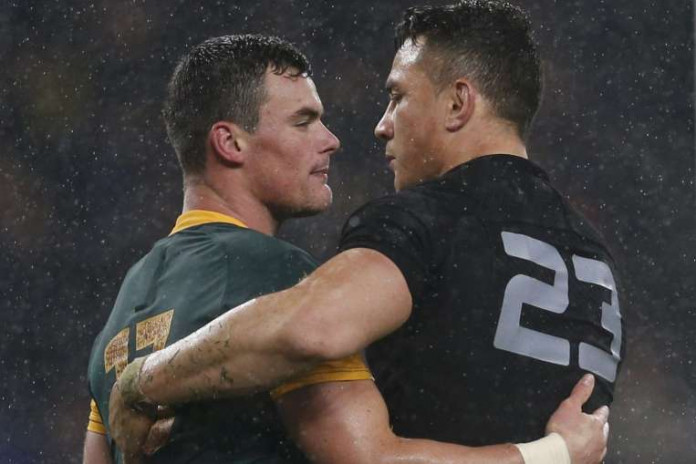
Photographs don’t always need to be worth a thousand words. Sometimes just one will do nicely.
Last weekend after the Rugby World Cup semi-final, South Africa’s Jesse Kriel sits on the ground, defeated and disconsolate. Last weekend, the victorious, hulking All Black, Sonny Bill Williams sees him, goes to him, comforts him.
Next day Kriel tweets the picture of them, accompanied by a solitary word: “Rugby.”
For the six weeks of this Cup a friend and I have been talking rugby. Neither of us was born to this sport nor bred to it, which is why “loosies” for us is not a position but a condition. But as inhabitants of a Mourinho-whining planet, where lunatics in suits want to segregate black fans in stadiums, it is gratifying that these Guinness-swallowing rugby athletes know that respect and rivalry can bloodily co-exist.
We’re not used to this. We’re used to riots after defeat, not the journalist Olly Barratt tweeting after Japan’s upset of South Africa:
“Rugby is looking good but even more it is making sport look good. These are not quite the muscular missionaries of charity at work but as an advertisement for how men should play it is audaciously adult.”
“Train pulls into Brighton, SA fans insist Japan supporters get off first, give them a guard of honour and cheer them off. Amazing day.”
We’re used to World Cups of football and mutinies and money squabbles except here Williams, him again, offers two tickets to Syrian refugees, whileAustralia’s David Pocock – the rugby poacher who loves wildlife – wants to invite David Attenborough to the final. What is this, the conscience Cup?
We’re used to over-hyped duels and tiresome trash talk and here the All Blacks invite the Namibians for a beer and pose for selfies.
We’re used to cricket nations bumping egos and here the Wallabies tweet “Thank you @unionargentina for another epic encounter. Congratulations on a superb tournament!” and the Argentinians tweet back: “Congratulations @Wallabies on getting through to the final. See you again next year!”
Civility. Regard. Dignity. Fairness. Unity. All words sport likes to flourish, all meaningless rhetoric till it is lived, all of it vital because we’re relentlessly hollowing out sport of all its value till one day everything will just be bright lights, big noise and an empty shell. All show, no substance.
Of course everyone wants to win, it’s what they dream of and train for, or as Vince Lombardi noted: “Why else do they keep score?” But in an endless, weekly maze of goals, runs, putts, aces, it’s the brilliant which sticks out but also the memorable. How a game is won and yet also how it is played. Some sports, like tennis, do this well, butthis Cup has done it beautifully.
Rugby is looking good but even more it is making sport look good. These are not quite the muscular missionaries of charity at work but as an advertisement for how men should play it is audaciously adult.
Manliness isn’t thuggery, it is in fact bruising tackle, rearranged nose, torn eyebrow and then clapping the rival off the ground. Not just a cursory clap but standing in a line and applauding, team to team. To be able to do that – and they have – constitutes character.
Neil Best, who bruised a few ribs in his time as an Irish international, shrugs down the phone line. “It’s par for the course,” he says. “I’ve never played a game where I have not clapped or been clapped off.”
History – where your sport came from, who paved the way for you – has to be taught and cultures have to be emphasised. Best remembers rugby games as a boy when teachers from opposing schools refereed one half each. “You can’t talk back to your teacher because you’re going to see him again. And you can’t be rude to the other teacher because you’ll let down your school.”
It’s possibly why in rugby – unlike football where referees are drenched in invective – there is limited talking back, pointing, swearing, snarling. Just captains, like over-sized sinners, listening to a pint-sized priest with a whistle.
“I just don’t know,” says Best, “why the powers that be let the referee in football be berated constantly. Whoever is in charge (of the sport) is letting it happen.”
Rugby is hardly saintly but its culture has so many specks of beauty. In the stands you can see the oddest thing, as fans, their painted faces identifying their various tribes, are occasionally lumped together. Light mockery breaks out, rarely ugly mayhem. Best cheered for Wales at the stadium while sitting behind South African fans and he remembers only a teasing camaraderie.
It is been a sizzling Cup, competitive and heart-breaking. It has been a Cup of the great gesture of sportsmanship and yet the routine gesture of congratulation. It has been a Cup that has given sport a memory and also meaning. And it has been a Cup that matters, for how else do we appreciate the better parts of sport if no one shows them to us.
















